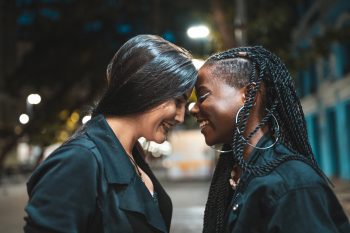Home / Health & Wellness Articles / Mental Health /
Mental Health Challenges in the LGBTQ+ Community

Those in the LGBTQ+ community are often met with significant barriers when seeking mental health treatment. According to The Trevor Project, 60 percent of LGBTQ+ youth who wanted mental health care in the past year could not receive it. Why?
“LGBTQ+ youth are consistently met with more restrictions, bans, and legislation threatening their identity,” says Haley Stocker, Director of Learning & Development at Centerstone.
Major barriers include:
- Lack of culturally competent healthcare providers: Cultural competence is understanding and respecting values and beliefs that differ across cultures—this is needed in healthcare settings. providers should learn more about the concerns and healthcare disparities of the LGBTQ+ community.
- Lack of resources to access affordable healthcare: The LGBTQ+ community experiences higher rates of poverty and homelessness, which means they are less likely to have appropriate health insurance coverage or may have insufficient funds to pay for treatment and services.
- Lack of safety: Many LGBTQ+ individuals have experienced discrimination or stigma in healthcare settings, so seeking and receiving healthcare can feel unsafe.
“Due to the many barriers associated with access to care, many LGBTQ+ individuals can be unable to access or receive care when they need it,” says Stocker. “But there are ways to address this.”
“First, it is important that healthcare providers have a baseline knowledge about the LGBTQ+ community and their health needs,” says Stocker. “Second, it is imperative that providers educate themselves on LGBTQ+ health care disparities and special needs in order to exist as culturally competent providers. For therapists, this is something we are called to do in our codes of ethics.”
As allies, here are some ways to help the LGBTQ+ community:
- Advocate. Speak out against legislation that would further disenfranchise LGBTQ+ individuals.
- Educate. Maintain a knowledge and understanding of LGBTQ+ terminology, culture, and organizations.
- Check bias. Assess any personal bias—knowing how to address it and what to do with it can make a massive difference in how you view a larger community.
- Offer support. Help LGBTQ+ friends, colleagues, and family battle harmful stereotypes whenever you encounter any of those.
Let’s help our LGBTQ+ community minimize the barriers to accessing the care they deserve.
If you or someone you know is struggling with their mental health, Centerstone can help. Call 1-877-HOPE123 (1-877-467-3123) for more information.


